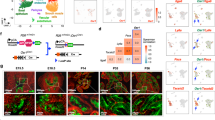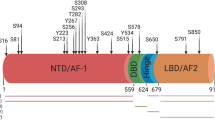Abstract
Androgen deprivation therapy for advanced prostate cancer is often effective, but not curative. Molecular pathways mediating the therapeutic response and those contributing to the subsequent hormone-refractory cell growth remain poorly understood. Here, cDNA microarray analysis of human CWR22 prostate cancer xenografts during the course of androgen deprivation therapy revealed distinct global gene expression profiles in primary, regressing and recurrent tumors. Elucidation of the genes involved in the transition between these states implicated specific molecular mechanisms in therapy failure and tumor progression. First, we identified a set of androgen-responsive genes whose expression decreased during the therapy response, but was then systematically restored in the recurrent tumors. In addition, altered expression of genes that encode known targets of rapamycin or that converge on the PI3K/AKT/FRAP pathway was observed in the recurrent tumors. Further suggestion for the involvement of these genes in hormone-refractory prostate cancer came from the observation that cells established from the recurrent xenografts were strongly inhibited in vitro by rapamycin. The results of this functional genomic analysis suggest that the combined effect of re-expression of androgen-responsive genes as well as the activation of rapamycin-sensitive signaling may drive prostate cancer progression, and contribute to the failure of androgen-deprivation therapy.
This is a preview of subscription content, access via your institution
Access options
Subscribe to this journal
Receive 50 print issues and online access
$259.00 per year
only $5.18 per issue
Buy this article
- Purchase on Springer Link
- Instant access to full article PDF
Prices may be subject to local taxes which are calculated during checkout



Similar content being viewed by others
References
Abreu-Martin MT, Chari A, Palladino AA, Craft NA, Sawyers CL . 1999 Mol. Cell Biol. 19: 5143–5154
Amler LC, Agus DB, LeDuc C, Sapinoso ML, Fox WD, Kern S, Lee D, Wang V, Leysens M, Higgins B, Martin J, Gerald W, Dracopoli N, Cordon-Cardo C, Scher HI, Hampton GM . 2000 Cancer Res. 60: 6134–6141
Brunn GJ, Williams J, Sabers C, Wiederrecht G, Lawrence Jr JC, Abraham RT . 1996 EMBO J. 15: 5256–5267
Bubendorf L, Kolmer M, Kononen J, Koivisto P, Mousses S, Chen Y, Mahlamaki E, Schraml P, Moch H, Willi N, Elkahloun AG, Pretlow TG, Gasser TC, Mihatsch MJ, Sauter G, Kallioniemi OP . 1999 J. Natl. Cancer Inst. 91: 1758–1764
Cheng L, Sun J, Pretlow TG, Culp J, Yang NS . 1996 J. Natl. Cancer Inst. 88: 607–611
Craft N, Sawyers CL . 1998 Cancer Metastasis Rev. 17: 421–427
Craft N, Shostak Y, Carey M, Sawyers CL . 1999 Nat. Med. 5: 280–285
Culig Z, Hobisch A, Cronauer MV, Radmayr C, Trapman J, Hittmair A, Bartsch G, Klocker H . 1994 Cancer Res. 54: 5474–5478
Dilling MB, Dias P, Shapiro DN, Germain GS, Johnson RK, Houghton PJ . 1994 Cancer Res. 54: 903–907
Gregory CW, Hamil KG, Kim D, Hall SH, Pretlow TG, Mohler JL, French FS . 1998 Cancer Res. 58: 5718–5724
Hosoi H, Dilling MB, Liu LN, Danks MK, Shikata T, Sekulic A, Abraham RT, Lawrence Jr JC, Houghton PJ . 1998 Mol. Pharmacol. 54: 815–824
Khan J, Simon R, Bittner M, Chen Y, Leighton SB, Pohida T, Smith PD, Jiang Y, Gooden GC, Trent JM, Meltzer PS . 1998 Cancer Res. 58: 5009–5013
Kunz J, Henriquez R, Schneider U, Deuter-Reinhard M, Movva NR, Hall MN . 1993 Cell 73: 585–596
Liu J, Farmer Jr JD, Lane WS, Friedman J, Weissman I, Schreiber SL . 1991 Cell 66: 807–815
Mousses S, Bittner ML, Chen Y, Doughtery ER, Baxevanis A, Meltzer PS, Trent JM . 2000 Functional Genomics: Gene Expression Analysis by cDNA Microarrays Livesey FJ and Hunt SP (eds) Oxford University Press: Oxford pp 113–137
Nagabhushan M, Miller CM, Pretlow TP, Giaconia JM, Edgehouse NL, Schwartz S, Kung HJ, de Vere White RW, Gumerlock PH, Resnick MI, Amini SB, Pretlow TG . 1996 Cancer Res. 56: 3042–3046
Nair SC, Rimerman RA, Toran EJ, Chen S, Prapapanich V, Butts RN, Smith DF . 1997 Mol. Cell.Biol. 17: 594–603
Peterziel H, Mink S, Schonert A, Becker M, Klocker H, Cato AC . 1999 Oncogene 18: 6322–6329
Pretlow TG, Wolman SR, Micale MA, Pelley RJ, Kursh ED, Resnick MI, Bodner DR, Jacobberger JW, Delmoro CM, Giaconia JM, et al. 1993 J. Natl. Cancer Inst. 85: 394–398
Sabers CJ, Martin MM, Brunn GJ, Williams JM, Dumont FJ, Wiederrecht G, Abraham RT . 1995 J. Biol. Chem. 270: 815–822
Sekulic A, Hudson CC, Homme JL, Yin P, Otterness DM, Karnitz LM, Abraham RT . 2000 Cancer Res. 60: 3504–3513
Wainstein MA, He F, Robinson D, Kung HJ, Schwartz S, Giaconia JM, Edgehouse NL, Pretlow TP, Bodner DR, Kursh ED, Pretlow TG . 1994 Cancer Res. 54: 6049–6052
Acknowledgements
Supported in part by NIH grant CA57179 (to T Pretlow), CaPCURE (L Bubendorf) and Swiss National Science Foundation (L Bubendorf and U Wagner) and the Krebsliga beider Basel and Novartis Foundation (U Wagner).
Author information
Authors and Affiliations
Corresponding author
Rights and permissions
About this article
Cite this article
Mousses, S., Wagner, U., Chen, Y. et al. Failure of hormone therapy in prostate cancer involves systematic restoration of androgen responsive genes and activation of rapamycin sensitive signaling. Oncogene 20, 6718–6723 (2001). https://doi.org/10.1038/sj.onc.1204889
Received:
Revised:
Accepted:
Published:
Issue Date:
DOI: https://doi.org/10.1038/sj.onc.1204889
Keywords
This article is cited by
-
The inhibitory effect of melatonin on human prostate cancer
Cell Communication and Signaling (2021)
-
Exosomal long noncoding RNA HOXD-AS1 promotes prostate cancer metastasis via miR-361-5p/FOXM1 axis
Cell Death & Disease (2021)
-
Plasma S100P level as a novel prognostic marker of metastatic breast cancer
Breast Cancer Research and Treatment (2016)
-
Adaptation or selection—mechanisms of castration-resistant prostate cancer
Nature Reviews Urology (2013)
-
Characterisations of human prostate stem cells reveal deficiency in class I UGT enzymes as a novel mechanism for castration-resistant prostate cancer
British Journal of Cancer (2013)



